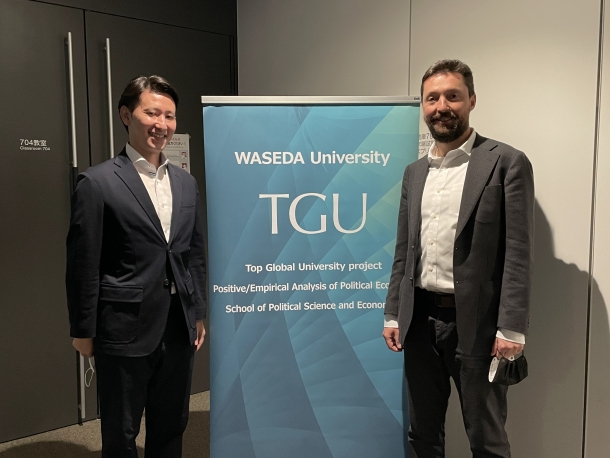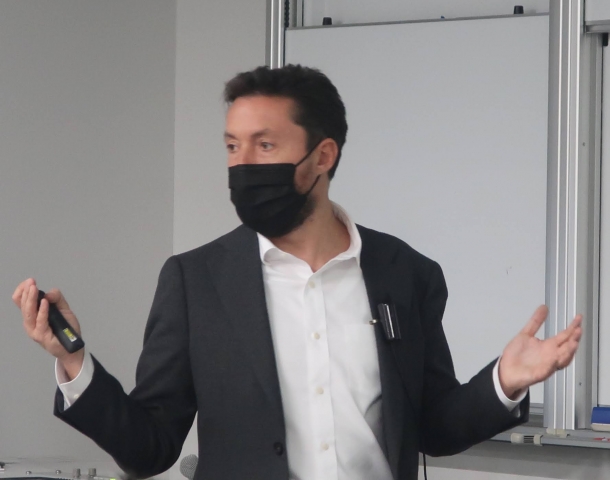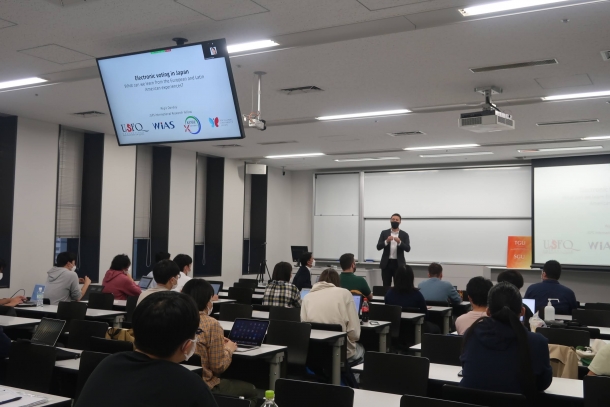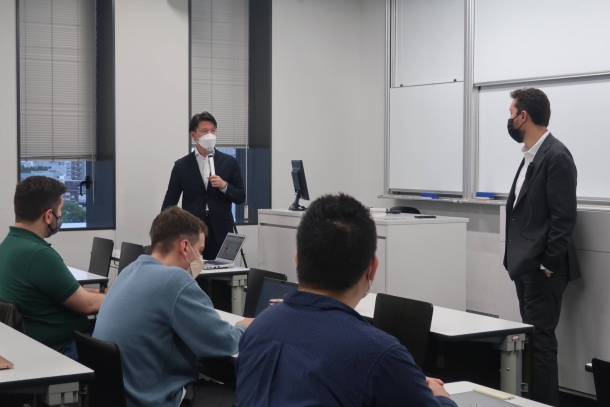On October 18, 2022, a special lecture on electronic voting in Japan was held in person at Waseda University, hosted by the Center for Positive/Empirical Analysis of Political Economy and the Waseda Institute for Advanced Study.
It was an honor to welcome Professor Régis Dandoy (Universidad San Francisco de Quito, Ecuador) to this joint event under the Top Global University Project at Waseda University. It was truly a fantastic seminar, where he left many tips to students.

With host professor, Dr. Airo Hino, Faculty of Political Science and Economics

Professor Régis Dandoy at the seminar
Being an expert in the field of e-voting, after having collaborated with the Ecuadorian National Electoral Council and the Belgian Ministry of Interior Affairs and having monitored electoral processes in many countries, Professor Dandoy spoke on the e-voting trials in Japan and how they can be compared to European and Latin American experiences. The talk addressed various important questions about how e-voting affects turnout, invalid votes, and split-ticket voting in elections.

The talk was followed by a lively Q&A session. For example, a student posed a question related to how usability differences of e-voting devices across countries may have an impact on the results. Professor Dandoy answered with an actual example: that a party not listed on the top page of the party list garnered fewer votes than other municipalities held with a normal ballot. With these discussions, participants had a chance of learning new insights from Professor Dandoy on what impact e-voting may have on electoral processes.
Robert Nordström, 4th year PhD student, Graduate School of Political Science
I’m a doctoral student at Waseda University’s Graduate School of Political Science. My research interests lie in Japanese local elections and how electoral competition is correlated to the quality of democracy. These were my thoughts on the lecture “Electronic voting on Japan: What we can learn from the European and Latin American experiences” by Professor Régis Dandoy.
The presentation focused on the challenges posed by electronic voting or E-voting, and professor Dandoy’s insight as an expert with real-world experience in helping governments implement E-voting made meant that the findings were so much more insightful. In the presentation, professor Dandoy discussed how the introduction of E-voting influences voter turnout, the number of invalid votes and split voting. He also discussed how E-voting influences voters of different age-groups, gender, and backgrounds. To showcase his theories, Professor Dandoy provided evidence from E-voting systems in Japan, Europe, and Latin American countries.
In the first part of the presentation, professor Dandoy showed the impact E-voting has had on voter turnout. While the common expectation would be that E-voting should have a positive effect on voter turnout, professor Dandoy showed that E-voting in fact has led to fewer voters participating in elections in many countries. By using the concept of usability, professor Dandoy argued that while E-voting is meant to make it easier to vote, it is often poorly implemented making it more difficult for voters to cast their vote then using paper ballots. The lack of usability in E-voting was showcased by showing an example of a mock election in Belgium online where voters had to press dozens of buttons to be able to register their votes. This lack of usability, he argued, often lead to many voters not willing to participate in the democratic process. Further, if the technology of E-voting is difficult to use it may also lead to people failing to register their votes or even voting for the wrong candidate by mistake. Therefore, rather than improve usability, introduction of E-voting in many cases makes it harder for voters to cast their vote. It was also argued voters might be apprehensive regarding using new technologies overall. Professor Dandoy showed evidence for this theory by showing that E-voting had led to a drop in voter turnout in Belgium and Ecuador.
This is a very interesting finding as it shows that introduction of new technologies into our political systems might not always be positive. However, in a very interesting twist, professor Dandoy found that only in Japan did E-voting lead to increased voter turnout. This begs the question, why does E-voting lead to an increase in turnout in some cases while it leads to increased turnout in others and are there ways through which E-voting can be implemented without causing voter turnout to fall? Professor Dandoy admitted he did not know the answers to these questions and asked the audience to think about reasons why the effect was different in Japan.
The second of the presentation focused on E-voting influenced the number of invalid votes, arguing that E-voting makes it more difficult for voters to make invalid or blank votes. While under paper voting voters who are not satisfied with any of the choices of candidates are able to make an invalid vote by spoiling their ballot or voting blank. However, under E-voting it is sometimes not even possible to vote blank, and other times it is difficult for voters to know how to go about to make an invalid vote. This might lead to some voters either having to vote for candidates they don’t like or lead voters who would otherwise have voted blank to simply not vote at all instead. Professor Dandoy’s research also confirmed this, showing that E-voting did indeed lead to fewer invalid votes being cast in several countries. This argument was very important I felt, as it points out another problem with E-voting that is seldom considered.
In the final part of the presentation, professor Dandoy discussed the impact E-voting had on split-ticket voting and how voters of different age, gender, and backgrounds were affected differently by the introduction of E-voting. The question of internet voting was also quickly discussed. This was followed by a lively Q&A session with the audience. During the session, important questions were raised including regarding how E-voting is different depending on electoral system and the method of voting. One important point that was discussed was regarding political motives behind E-voting. Some politicians might willfully want to implement electoral methods that make it harder for some voters to participate to strengthen their advantage. This I thought was an interesting observation regarding why E-voting has often had so negative results. Others also wanted to ask more questions, but the session ran out of time at this stage.
To sum up, the presentation gave an interesting and comprehensive picture of the impact E-voting has had on democracy in many countries. By leaving the question of why the effect of E-voting was different in Japan, professor Dandoy showed that there is still much that is not known about how E-voting impacts voters.
Robert Nordström









